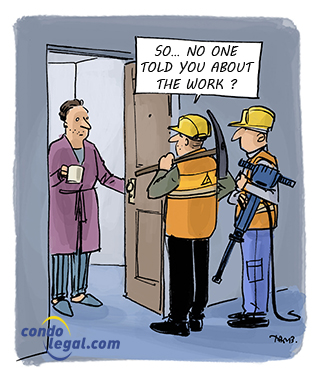28 Articles

The law not determining the rules applicable to the conservation of the register of co-ownership, it is therefore necessary to refer to the rules that may be prescribed in the declaration of co-ownership; on this subject, see Richard LeCouffe's chronicle entitled Time limits for keeping documents in the register. Furthermore, specialized companies offer their services for the archiving of co-ownership (condominium) documents by digitizing all papers; this dematerialization opens up the possibility of sending certain documents digitally....

The syndicate of co-owners is obliged to maintain a register of the co-ownership accessible to all the co-owners and so, in accordance with section 342 of the Civil Code of Québec. The board of directors is responsible for properly keeping the syndicate's books and register; the board may delegate this task to a third party member such as the condo manager who may issue copies of the documents in his possession. Until proven otherwise, any copy is considered proof of its content without the need to…...
.jpg)
Vehicle parking within the immovable may be organized as a common portion for restricted use. Most often than not, declarations of co-ownership (constituting act of co-ownership) designate the legal status of exterior parking spaces as common portions for restricted use; this is also true for indoor parking spaces when the developer (declarant) decides that it is not necessary to create a specific lot number for each space and so, these are therefore an integral part of the lot constituting the common portions of the immovable.…...

Despite increased congestion in major urban centers, many co-owners still favor their car as a means of transportation. The densification of cities accentuates chronic congestion which contributes to scarce parking spots on the streets. The situation is not much better in the suburbs since it is generally forbidden to park at night on the streets during the winter time. Access to parking is therefore an important issue for many co-owners and apartment buyers. This makes…...

Parking spaces designated as private portions are common in divided co-ownership; this specific legal status is granted to them by the declaration of co-ownership, which identifies them as fractions in the section dedicated to the description of the fractions. Similar to an apartment held in co-ownership (condominium), all parking spaces have a unique lot number, a relative value, and a share that are specific to them. As a result, the owners of the parking spaces can, during a…...

The notion of water damages generally includes the questioning of the civil liability of the syndicate, the co-owner and the lessee (tenant); the question of who is responsible for this is constantly being raised. Claims related to losses involving the liability of a co-owner are numerous in co-ownerships (condominiums); this is the case for a water heater that spills over several floors, this type of disaster being very expensive and explaining why the amount of insurance premiums and deductibles for syndicates of…...

Management of water heaters management in a co-ownership (condominium) requires meticulous organization including maintaining an installation registry and collaborating with the co-owners and so, in accordance with the provisions of the declaration of co-ownership; this document usually mentions that any intervention on a water heater such as its replacement must be approved by the board of directors to ensure that the work complies with the current standards and that the contractors are qualified as evidenced by their license and by their insurance....

A device present in most co-ownerships (condominiums), the water heater has an essential role in the comfort of all occupants of the immovable; it is thus one of the electrical appliances that is most solicited in housing establishments because it provides domestic hot water use for various purposes such as showering, hand washing and laundry. The operating mode of a water heater is simple: under pressure, cold water enters either through the side, base or top of the tank as it empties…...

After a water damage, the ultimate goal of the syndicate and the co-owners is to find themselves in the same situation as they were before the occurrence of the loss. Due to its legal structure, the rehabilitation of common portions and private portions can be particularly complex in a divided co-ownership; this is why it should be taken care of by a general contractor who is qualified in the field. Situations vary from one claim to another depending on the parts of…...

Water damages are the leading cause of loss ratio in co-ownerships (condominiums); they are also becoming more and more expensive and so, whether it concerns the syndicates of co-owners or their insurers. For reference, over the past decade, the proportion of water damages has more than doubled in immovables of co-ownerships. In order to limit the extent of damages caused by water leaks, water leak detection systems have been created to detect any abnormal amount of water on the floor; this type…...
